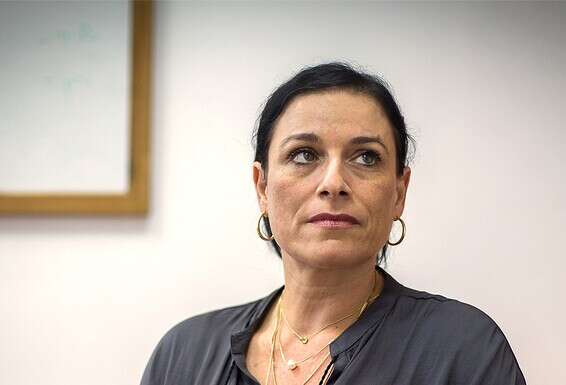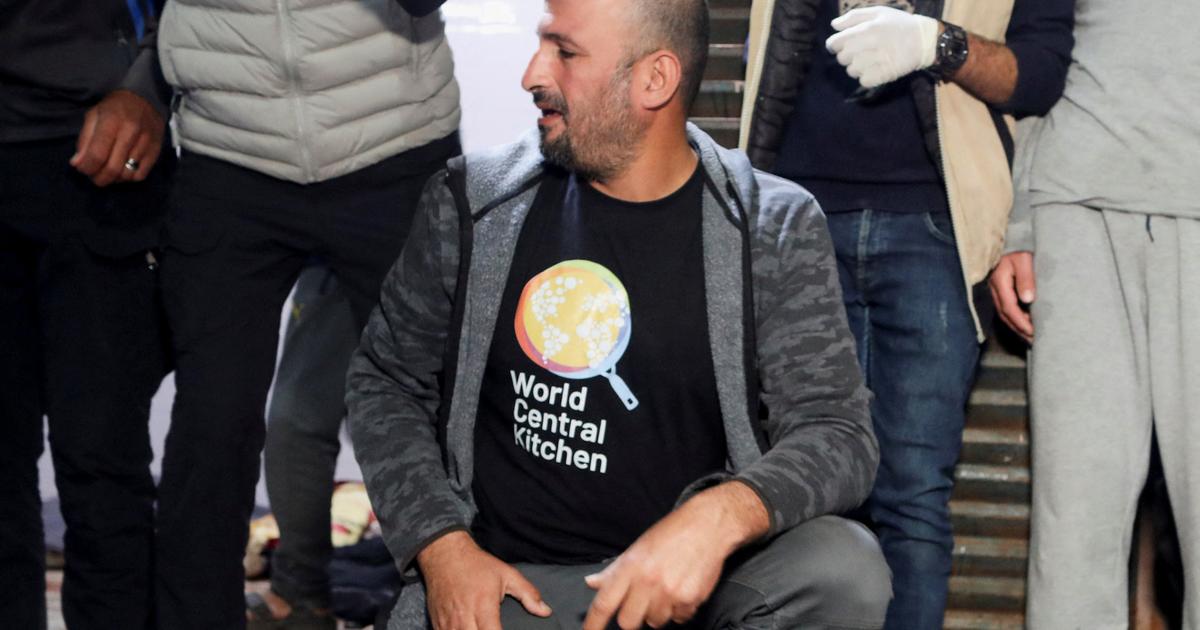National Insurance has become a beach in recent months where the Corona economic tsunami is shattered • A campaign between branches in Israel reveals insomniac workers who find it difficult to face the hardship • Tali Egyptian, director of the BM branch: "I find myself returning home with the stories and can't sleep"
"I saw the pain in his eyes. The buffer between us shattered my heart to pieces." Social Security Branch
Photo:
Oren Ben Hakun
Tali Egyptian, director of benefits (pension) at the National Insurance Institute's branch in Jerusalem, will not forget the day the place was closed to receive a crowd for fear of Corona's outbreak. Then she realized that she had been denied any possibility of serving face-to-face dozens of confused waiters, who knocked on the doors. One of them, a 70-year-old, was looking deep into her eyes through the porch, and she couldn't miss the fracture cavity.
"I saw the pain in his eyes, I recognized the shame he felt when he had to tell me about the vicissitudes of his life through the porthole, with 20 people waiting around him. And I couldn't bear it anymore. "
Egyptian (50), married and mother of three, lives in Tzur Hadassah and runs the department for about seven years. Until then, she worked in the Investigation Department, entered the homes and identified poverty and need on a daily basis. "The current crisis gives me flashbacks to a number I read in the past, 'About Blindness' - a novel that describes an epidemic that is plaguing society for serious upheavals and is losing its value. I never imagined that such a thing would happen here in Israel.
"Meeting this space again and again in people's eyes, the uncertainty, the existential fear, is a difficult task. I find myself coming home every day with these stories - and can't sleep, because I know there are families who can't fill the fridge "People who came to turnips because of an impossible situation forced on them."
Egyptian dew. "The main difficulty is to see these lost people again and again, and I wonder where we came from" // Photo: Oren Ben Hakon
The National Insurance Institute's unemployment figures describe a bleak picture: About one million citizens have lost their livelihoods since the outbreak, not including self-employed and business owners who are not eligible for unemployment benefits. Of all the unemployed, only 43 percent have returned to the employment market so far. This is in addition to 100,000 income assurance claims - an increase of more than 40 percent.
The average daily allowance of unemployment benefits is only NIS 174 per day, which indicates a significant drop in the eligible unemployment benefit compared to the pre-Corona period. 58 percent of unemployed claimants are in the age group of 39-18, young people and families in their early stages. Among the cities that particularly absorbed the price of the crisis - Eilat, Beersheba, Rishon Lezion and Jerusalem.
Like a tsunami wave
"We came to a new reality on March 15," says Karen Shamaia (42), the unemployment department manager, who, on average before the outbreak of the crisis, handled the staff of about 2,000 claims. In March alone there were 79,000 claims, out of some 120,000 so far treated at the branch.
"The Corona crisis broke out to us like a tsunami wave that washed the branch one bright day, with no time for preparation, when we had no idea what a day would be. Initially, there were 200,000 unemployed, today we are talking about a million, and that does not include the self-employed." In view of the restrictions on receiving the public at the branches, the National Insurance Institute organized and mobilized most of its technological resources to circumvent the need for the arrival of policyholders, with many calls being handled by telephone.
"There is more compassion today." Facts of the unemployment department at the Social Security branch in Beer Sheva // Photo: Dudu Grinshpan
A visit to the Jerusalem Central Branch in the morning is surprising. The expectation was for a long queue of dozens, but the branch is relatively spacious, and the real load is characterized by a general confusion, with no horizon to end a crisis, in the week when the economy went back to additional restrictions, with the expectation of another unemployed wave.
Since the outbreak of the crisis, the work day of the staff still working in an emergency procedure begins at 6:30 AM and ends in the evening. "I remember the moment I stood in front of the crates stacked on each other, and I just broke down, every form in the crate is a person, it's a family, and it's not caught," says Shmaya. "Within days of the hardship, we set up several branches around town."
And yet, even when the team can record an unparalleled achievement in handling hundreds of thousands of claims around the clock, in a short space of time, the main complaint is that the aid - a mockery to Rash. "A single allowance is about NIS 1,900. Take a young 35-year-old who lives on rent - paying property taxes, electricity, water, has to go to the grocery store - where does all this go in? Obviously he has no way to survive the month, so we have no choice, and it happens quite a bit That we involve welfare, ”emphasizes Egyptian.
Indeed, this week associations that help those in need of food baskets reported a hundred percent increase in aid requirements. Egyptian: "I have personal relationships with quite a few insureds that I support in one way or another. I can't live with the thought of that single parent who goes to bed knowing that her child will wake up in the morning, and all she has in her closet is bread and chocolate for the day. "The joy that emotion drives me is my motivation. However, the main difficulty is seeing these lost people again and again, and I wonder where we came from, when we lost our way, and most importantly - towards what future we are marching as a company," concludes Egyptian.
Meir Spiegeler. "I will continue to fight with the Minister of Labor and Social Welfare for the eligibility of self-employed people for unemployment benefits" // Photo: Oren Ben Hakun
Yaron French (50), chairman of the National Insurance Institute's staff for 20 years, experiences daily the burden the team is facing. "From the beginning of the crisis, our employees do not see daylight. They do not know what Friday is, they did not see Passover. These are people who left their families at home, some of them living alone. They are at the forefront of the struggle for unemployment. There is no such thing as a 'regular audience' that comes to the branch. "Everyone is in a bad situation. People find themselves in the poverty line. The workers are the punching bag, with the real frustration being directed at state captains."
Are you watching suicides?
"Already today we hear the cries of those who want to end their lives, it is already here and there. These are people who have worked all their lives, they are catastrophic and do not see a horizon."
Whole Lifecycle Courses
Quite a few of the staff are aware of the general stigma created around National Insurance Institute officials, "No one here is an ID number, the plight of the people who come here is experienced as a direct punch to the stomach," notes Sarit Menashe (52), who works in customer service and receiving public assistance at the National Insurance Institute It's been 25 years.
"There are people who are unaware that we see each and every one of them as our family, this period everyone met on a personal level. If it's the couple who went to the US, relatives who worked in the tourism industry and lost their livelihoods. This is us, this is Israel. "However, despite the assistance Menashe felt her hands bound:" We are between the hammer and the anvil, between the limitations of the law and the distress that cries out to heaven. Trying to find more and more aspects of aid, of extracting rights all the time, and we usually have no where, and there is terrible frustration, it's hard for me to describe to you how much. "
What is the main mood in the branch?
"Most of the people we treat today are a population that has never been in Social Security, people who have worked all their lives, certainly in a city like Rishon LeZion, where a working and educated population. Most of the questions are about clarifying the rights and this is accompanied by deep frustration from the allowance. There is tremendous frustration here on this issue, because even after unemployment eligibility has been approved, it is not enough, people are far less entitled to what they have become accustomed to earning. And there is a lack of logic in the law. For example, not providing unemployment benefits to the self-employed. They pay most of the insurance premiums, this money has a budget for the allowances we pay, so how come they have no answer at all? "
For Little Mordechai (33), every day at the Corona monthly branch is complex. "The heart breaks when you meet adults and seniors who have lost their livelihoods. This week I treated the case of a 70-year-old woman who continued to work after retirement for a choice, lost her livelihood and was also hurt by the crisis. She broke up on me over the phone. To her house, and I pick up a phone every day. My goal is to give people the treatment I would like to have if I were on the other side. "
Sarit Menashe. "The frustration is tremendous, because even after unemployment eligibility is confirmed, it is not enough" // Photo: Yossi Zeliger
Sara Tsumman Hamami (62), director of the unemployment department, came right in with the end of training for the crisis period. "I came from the alimony field, finished my training, and today I run into quite a few of those women in unemployment benefits claims." In a normal month, the branch handled an average of 700 inquiries, but since March, at least 1,500 claims have been made each day. "Nobody will forget March 25, so we got 10,000 claims - it was really scary, so I realized we had entered a new and very bleak reality. So far we have handled more than 33,000," notes Osnat Ben Zikri (48), who has been working at the branch for 18 years.
Many left behind families, some single parents or single breadwinners. "We haven't felt the fatigue until today. I'm in the market that managed it," notes Leah Blumenblatt, 60, who works in the unemployment department for 28 years. "What is particularly troubling to us these days is the new wave of layoffs. Last Thursday we handled dozens of new cases, and it seems to be increasing. In the last two months we have seen how entire livestock plants are being destroyed - I feel there is more compassion. Unemployment is forced on everyone, you talk to people and just Holds yourself not to cry. "
A second wave is also in unemployment
The Beer Sheva branch, which handles all the residents of the south, including the residents of Eilat and Dimona, is considered one of the busiest. On average, about 1,500 people and women arrive, diverse audiences including the USSR and Ethiopian immigrants, along with the Bedouin diaspora. The team is studying emergency treatment of the public, in light of the precarious security situation in the area. Receiving the audience, assisting dozens of deer on the branch doors, locates those who have not been able to make an appointment on their own, directing them to relevant forms while adhering to the rules of social remoteness.
"Alongside 82,000 unemployment claims, the number of nursing applications has almost doubled, many elderly people converting their hours of eligibility to the caregiver - fearing he will come home - into the benefit of money. Allowances) at the branch.
The call is joined by counterpart Israel Bless Israel (43), who has been working in the reception department for 20 years. "The main mental state that people deal with is complete uncertainty. The cases themselves are complex. This week I dealt with a layoff, and during a conversation it became clear that he also broke his leg during work, in addition to dealing with a child with a disability, which is one of many cases. To claim unemployment, then you realize that the main task is to find and exercise all the rights they are not even aware of. "
In light of the wave of lawsuits that have affected the unemployment departments, dozens of employees (mainly in the field of collection and investigations) have been routed to handle the claims. Hadas Samuel Litzer and Tamar Nadau were joined for service from the reception department. "We were trained in an expedited course in a matter of hours," says Shmuel Litzer, a sole breadwinner and mother of one year old.
One of the evidences of the depth of the economic crisis is the economic erosion of middle-class citizens. "You link the pages to the adversity of the people at the counter. It's scary to see how people who got well-earned and didn't need any help can't buy basic products today," Nadau emphasizes. "Take for example an IDF pensioner, a father of four, who receives an allowance of NIS 4,000 and earns an additional 4,000, and lost his job. Until the allowance was offset, he would be shekeled against the shekel from the allowance, leaving him with nothing. This is the state of the middle class today, so you can imagine what happens to low socio-economic people. The heart was torn. "
As tens of thousands of lawsuits are completed, the unemployment department's officials are now witnessing a resurgence. "People who returned from the USSR two weeks ago are receiving dismissal letters, which is scary," says the clerk Gila Hazan. "Now, with the new restrictions that are emerging, it seems that people have been able to pick up a few of the fragments. They are again heading for business closure and unemployment."
Where did NIS 400 billion go?
Despite the challenges of the period, the National Insurance Institute can record significant gains in favor of policyholders since the crisis broke out. Among other things, the decision not to deduct allowances, shorten the training period for eligibility for unemployment from six months, and concern for grants to senior citizens. Other achievements were recorded this week: the extension of the entitlement to receive unemployment benefits until mid-August, approval of unemployment benefit entitlements for laid-off workers from January-February, together with the cancellation of the obligation to deduct five days of waiting for the unemployment benefit payment. Meir Spiegeler, the director general of the institution, does not miss any conversations with those waiting outside the branch during the tour and to check the status of the employees in all departments. Despite the achievements, he is very disturbed about the future.
"Until the Corona crisis, we had 3.4 percent unemployment, today's order of magnitude has changed and we are in a deep and unending economic crisis. The institution raised funds, left surpluses, and each year these surpluses were given to the Treasury and it was to be returned to the public coffers. From 1980 to the present, close to NIS 400 billion has been taken from the public and not returned, which is money to serve it, probably in times of crisis. "
Spigler raises another concern: "I am deeply disturbed by the possibility that the Treasury Department will, in due course, undermine the allowances insured by the Arrangements Law and fill the allowances in favor of the deficit itself. Its for the unemployed, not to mention old-age pensions and income support. "
What do you require at this point?
"I will continue to fight with the Minister of Labor and Social Welfare for the eligibility of self-employed persons for unemployment benefits, and I believe that the public outcry will do its thing. It is inconceivable that the sovereign will force unemployment to citizens without accepting it. Employment. It's irresistible openness and audacity. Whoever says it was never unemployed. Unemployment crushes families, crushes a person's self-confidence. "
What additional steps do you suggest?
"We must give everyone social security without exception. The state should incentivize self-employed people who can hire workers again. Must work with a flexible ILA during this period and not provide the aid for 30 days, where the employee is forced to stay home and not work. Businesses that are under a broken trough should be allowed a flexible deal so that they are not forced to lay off workers, and the National Insurance Institute will supplement the remainder through the unemployment benefit. Citizens should also be facilitated and unemployment funds transferred directly to employers. "
The Treasury Budget Department states: "Through the state budget, tens of billions of shekels are transferred each year to the National Insurance Institute for the payment of annuities to Israeli residents. The state budget surpluses, which are derived from the state budget, are transferred annually for subsidized interest bonds. The Ministry of Finance annually repays the said debt to the National Insurance Institute and will continue to do so. "









